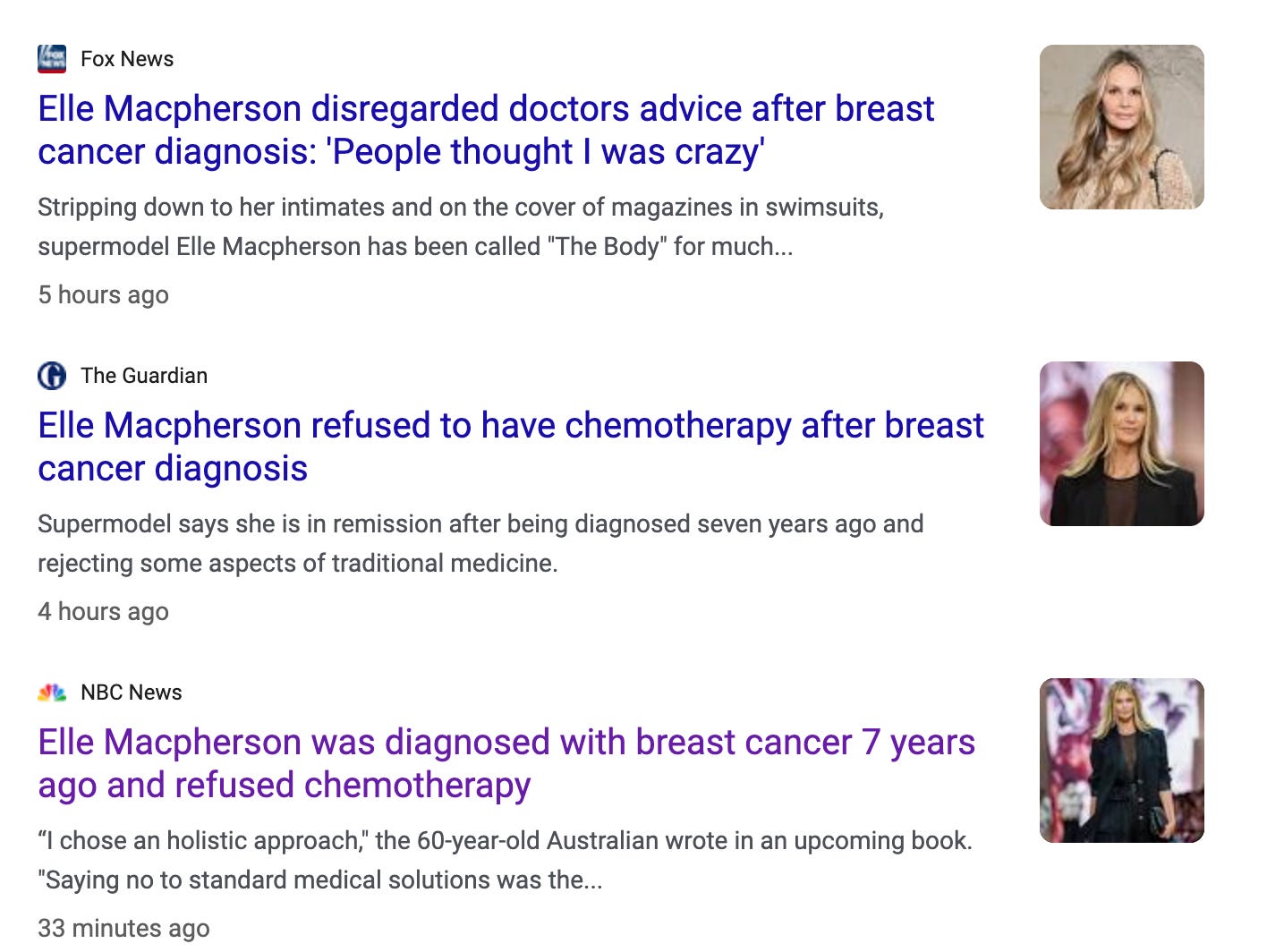Elle Macpherson Made a Reasonable Choice, and Naturopathic Medicine Did Not Help
Declining adjuvant chemotherapy is fair, if you understand the risks
The lay media is abuzz with stories about Elle Macpherson, who admits in a new memoir to declining chemotherapy seven years ago. Although precise details are not provided, it sounds like Ms. Macpherson had localized or regional breast cancer and underwent surgery.
We learned something about the risks of commenting on the health of celebrities over a decade ago when an OpEd we published in Washington Post about former president George W. Bush caused a bit of a firestorm. We still feel like you can learn something from the care, and coverage of the care, of the rich and famous.
Chemotherapy is sometimes offered to a woman after surgery for localized breast cancer. This is referred to as adjuvant therapy. The goal of adjuvant therapy is to reduce the risk of breast cancer recurrence and improve survival. Without knowing the precise details, the magnitude of the benefit is typically 2-7%. To give some rough (and plausible numbers), 16 women out of 20 might be cured by surgery alone, but 17 women out of 20 would be cured with surgery and chemotherapy. Put another way, 20 women have to take chemotherapy so that 1 more is cured. And, sadly, 3 will have recurrence no matter what they do.
Elle Macpherson didn’t want chemotherapy and declined it. That is a personal choice. Some people might not want the toxicity or side effects and be willing to risk a higher chance of recurrent cancer. Alex Honnold gets to decide he wants to rock climb, Elle Macpherson can choose not to get chemotherapy. The media meanwhile barely understands this, and is generally critical of Elle saying she ‘refused’ or ‘disregarded doctors advice.’ That’s paternalistic and incorrect.
Our guiding principle in medicine today is shared decision making. A doctor provides what is known about the expected harms and benefits of therapy. The patients weighs these facts with her values and makes an informed decision about her health care. The strongest stand a doctor should take is, “you’re accepting a higher risk if you choose this strategy but that is your decision to make.”
Everyday, patients choose more aggressive therapy that lowers their risk of harm from their disease or less aggressive therapy that raises the risk. Sometime for the former end up being unlucky, sometimes the latter end up lucky. Often, their choice does not matter.
Ms. Macpherson was lucky. She made a personal choice to take a little extra risk with her breast cancer to avoid the toxicity of therapy. We celebrate her good health.
However, she credits her favorable outcome to a holistic approach, and that she found “a solution that worked for me”. We do think this sends the wrong message. It was not holistic therapy that saved her. She was among the 16 or so women out of 20 cured with surgery. Rather than pitching her wellness strategy, we wish she had used this opportunity to talk about informed decision making.
What the story of Elle Macpherson reveals most is that the media (both social and traditional) is nearly incapable of covering celebrity health with nuance and tact. Celebrities are either complete morons, dedicated to wheatgrass or acai berries, or heroes who stood up to the evils of modern medicine. Can we just be a little sensible?




I'm not sure how you can definitively conclude that holistic therapy did not contribute to -- possibly significantly -- her outcome. You did not discuss or even mention those therapies and any studies that might clarify potential efficacy. Heck, even placebos can have true positive effects, why would you think a nuanced, intelligent approach to nutrition wouldn't?
Chemotherapy and other adjuvant therapies based on their success rate on 5-year survival rates. How do you know that Elle's 7 -year survival has nothing to do with the therapies she chose?
How many cancer patients going all in on chemo are encouraged to eat anything they like (so, most likely in our society, junk food)? Do you really think there's no potential for junk food choices to play a role in cancer rates?
Good article, but you are totally off-base to assume naturopathic medicine didn't help. That's not skepticism. That's dismissal. Using it instead of chemotherapy along with surgery is an excellent choice. It's very plausible that it can help. You woudl recommend diets rich in phytochemicals for cancer prevention, so why would it be different for cancer recurrence? Even just eating a small amount of flax seeds has been shown in a few small trials to cause some favorable changes in biomarkers in later-excised breast or prostate cancers, or even to have possibly shrunk them. In general, a lot of naturopathic cancer treatment can be classed as phytochemical polypharmacy, which is an excellent strategy that usually works for most cancers, anywhere from a little to a lot. Yes it does. The literature overwhelmingly says to expect complimentary action when you combine anti-cancer phytochemicals, as opposed to antagonism. The first cancer patient I worked with was terminal (4 to 6 weeks) with metastatic colon cancer. Supplements cured his three large liver mets (largest dimension 13cm), and then surgery cured his primary tumor. This for a man on hospice. with elephant legs and abdomen, can't sit up, barely whispers, and colon was totally impacted and could still only pass pencil-thin stools after being purged due to tumor strangulating the cecum. He never took any chemo or radiation and spontaneous remission doesn't just happen for this. Everything biopsy confirmed. He's 90+ and in remission for 15 years. Open your minds!
But admitted, surgery was probably sufficient in this woman.|
Edit: To be clear, I wouldn't go to most holistic practitioners. Just don't like the potential of what is possible being overlooked.